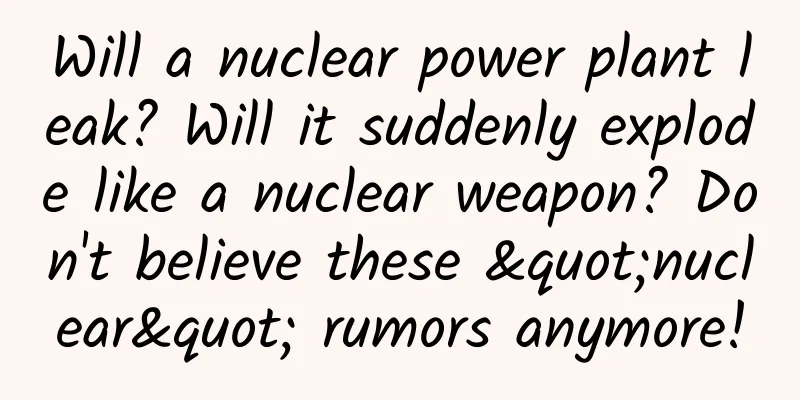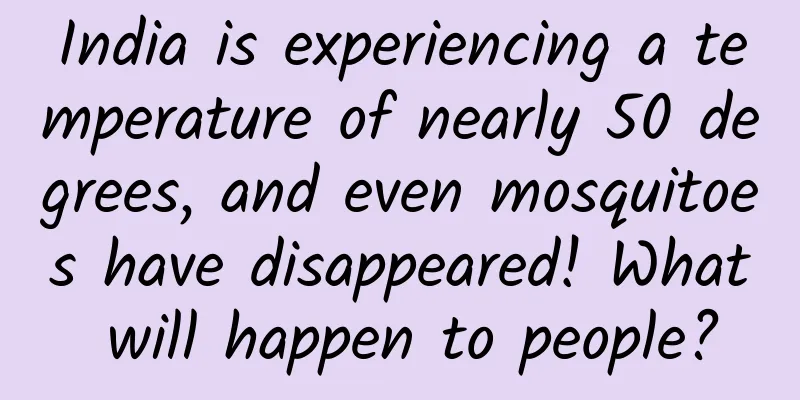Will a nuclear power plant leak? Will it suddenly explode like a nuclear weapon? Don't believe these "nuclear" rumors anymore!

|
When it comes to the word "nuclear", many people may think of radiation, X-rays and CT scans in the hospital, and think that it will harm their personal health, so they begin to worry, fear, and feel anxious. We often hear that exposure to nuclear radiation will turn you into a monster, and that nuclear power plants will explode like atomic bombs. Is nuclear radiation really that scary? Why do people always get scared when talking about the word "nuclear"? Today we have compiled several common misunderstandings about nuclear energy for you. Next, let’s smash these rumors one by one! 1. Radiation hazards are huge Can’t touch it at all? The "spoke" of radiation refers to the support between the wheel and the axle. "Radiation" borrows its shape to refer to the process in which energy or particles start from a source and propagate in all directions along a straight line. In fact, in daily life, there are many kinds of "radiation" and they are everywhere. Even each of us is a radiation source - constantly radiating infrared rays. Among them, nuclear radiation, also known as ionizing radiation, can cause harm to the human body only when it reaches a certain dose . For the sake of simplicity, the "radiation" we mention below today refers specifically to "nuclear radiation." The natural radiation doses received by residents in their daily lives. Source: China National Nuclear Corporation Publicity and Culture Center The effects of radiation on the human body are determined by the dose (the amount of radiation received) and the length of exposure. In our daily lives, we are actually exposed to low-dose radiation from nature every moment. The radiation medical examinations we usually do (X-rays, CT scans, etc.) have very low doses and will not cause any health effects to the human body if performed correctly according to medical advice. High-dose radiation exposure , such as serious nuclear accidents or accidental contact with radioactive materials, can indeed cause serious harm to the human body , including acute radiation sickness, increased risk of certain cancers, etc. Therefore, in places where there may be a risk of high-dose radiation exposure, there will be a large number of protective measures and strict regulations to prevent such dangers. Therefore, the impact of radiation on the human body depends on many factors, rather than simply "don't touch it at all" . Appropriate protection and management measures can effectively control and reduce the health risks of radiation exposure. As long as we have a deep understanding of the nature of radiation, we can safely use radiation itself and nuclear energy. my country's third-generation nuclear power Hualong One. Image source: China National Nuclear Corporation Publicity and Culture Center 2. Nuclear power plants are large radiation sources Will radiation leak out if we are not careful? This is a common misunderstanding . Everyone knows that banks and safes are strictly guarded, and nuclear power plants are even more so. To summarize roughly, nuclear power plants have reinforced concrete containment vessels that are meters thick, and the thickest can be thicker than Yao Ming's height; the reactor pressure vessel material is made of special alloy steel that is resistant to high temperatures and pressures, and can be several centimeters or even more than ten centimeters thick. These can ensure that the nuclear power plant can safely contain the working nuclear fuel, can stand firm in earthquakes, and can even withstand aircraft collisions and missile attacks. The internal structure of the containment. Image source: China National Nuclear Corporation Publicity and Culture Center In addition to being strong enough, nuclear power plants also have multiple layers of safety and protection, including thick protective walls that can absorb radiation, sealing systems, and layers of radioactive material filtration systems, so as not to pollute the environment. That’s not all. All important systems in nuclear power plants, including power supply, cooling, control systems, etc., have backups and even backups of backups… This way, even if something unexpected happens to the main system, it can be replaced in the first place, quickly shutting down the reactor and ensuring safety. You said someone sabotaged it? You are overthinking it. Nuclear power plants in all countries are very important facilities, and they are strictly guarded by armed personnel 24 hours a day. In addition, nuclear power plant staff also need to undergo extensive training and assessment, and frequently practice responding to various crisis situations. In addition, there are a large number of instruments inside and outside the nuclear power plant to monitor radiation levels, so any problems can be discovered immediately. Ecology around the nuclear power plant. Image source: China National Nuclear Corporation Publicity and Culture Center It is precisely because of the above measures that the radiation brought to the surrounding by a normally operating nuclear power plant is even lower than that in nature , and there have been only a few nuclear power plant leakage accidents . The Three Mile Island nuclear power plant accident also did not cause any casualties because the safety system played a role in time. Of course, it is undeniable that accidents such as Chernobyl and Fukushima have indeed occurred, causing serious consequences. But just as we should not give up on airplanes because of air crashes, we should not give up on nuclear power because of fear. The right approach is to learn from the lessons, strengthen supervision, and make nuclear power plants safer. 3. Once a nuclear leak occurs The accident area will be barren. Not even suitable for living? This statement may be influenced by "wasteland" type literary and artistic works, but the actual situation is not the case. The hazards of nuclear leakage are affected by many factors, including the scale of the leakage, the type of radioactive material, the environment and weather conditions in which the leakage occurs, and the response measures after the accident. Although a serious nuclear leak may indeed have a long-term impact on the environment and human settlements, it does not mean that the accident area will be barren or uninhabitable forever . Take the Chernobyl area as an example. Nearly 40 years have passed since the accident. Due to the migration of humans, local flora and fauna are no longer disturbed, but are thriving... And the areas around Chernobyl where radiation has dropped to a safer level are already inhabited by humans, and there are even short-term tours of Chernobyl (except for the most polluted core area). This shows that nature is still capable of "digesting" a certain degree of nuclear pollution . Of course, this does not mean that we can take it lightly. In fact, if a nuclear leak really happens, a lot of blockade, cleanup, and recovery work will be needed, and long-term environmental monitoring and health risk assessment will be needed to ensure safety. Therefore, we'd better make sure that there is no leak in the nuclear power plant. 4. Animals mutated by radiation will become A giant monster like Godzilla? This statement also comes from the imagination in science fiction movies and literary works. In reality, radiation exposure can cause damage to the DNA of organisms, which in turn may cause genetic mutations, which in most cases lead to death or disease. In addition, animals and plants may also show some adaptive changes in environments with higher radiation. However, these changes are far from the "mutated monsters" described in popular culture. Copyrighted images from the gallery, reprinting and using them may cause disputes In addition, just as it is impossible to safely build a building 10 times taller by simply enlarging the blueprint of a building 10 times, the body size changes of animals are not only related to genetic mutations, but are also subject to many factors , including weight, body strength, energy consumption, etc. This means that the animals in the current environment have a limit to their size, and it is impossible for them to grow hundreds of times larger than the original, becoming giant monsters that are dozens of stories tall and weigh tens of thousands of tons. In addition, studies after the Chernobyl nuclear accident found that wildlife populations in the affected areas were indeed affected, including genetic damage and reduced reproductive rates. But these animals are still the size we are familiar with, which can serve as a real reference to the impact of radiation on animals. Therefore, the idea that animals mutate due to radiation and become giant monsters like Godzilla is a science fiction plot that stems from people's fear of nuclear energy, but it does not conform to scientific facts. 5. If an explosion occurs at a nuclear power plant Will it be as terrible as an atomic bomb? Atom bombs are weapons, which require great power and emphasize "powerfulness". Nuclear power plants are used to generate electricity, which require safe output and emphasize "stability". The different purposes determine that there are huge differences between the two from structure, raw material selection, nuclear fission process to neutron source and control method. Specifically, an atomic bomb releases a large amount of energy through a rapid and uncontrolled nuclear fission chain reaction, which can instantly produce extreme temperatures and pressures, causing large-scale damage and high levels of immediate radiation exposure. On the other hand, the reactors in nuclear power plants have a large number of control facilities to adjust the speed of the reaction, and on the other hand, as mentioned above, nuclear power plants have a large number of safety protection measures and redundancy. In this way, even in the extreme case of a reactor core meltdown, the nuclear power plant will not explode directly like an atomic bomb. Even the most serious nuclear power plant accidents, such as Chernobyl and Fukushima, did not cause the main damage directly, let alone produce a huge explosion like an atomic bomb. To sum up, although the consequences of serious accidents at nuclear power plants can be very serious and require strict prevention and response measures, at least there is no need to worry about them becoming potential "atomic bombs" . Nuclear waste treatment. Image source: China National Nuclear Corporation Publicity and Culture Center 6. Nuclear waste cannot be safely handled or stored Will it affect the environment? This statement is not scientific . Nuclear waste does contain radioactive substances with a long half-life, which may pose a threat to the environment and human health, but modern technology and management methods have made it possible to handle and store nuclear waste relatively safely. Specifically, we can recycle spent nuclear fuel to reduce the amount of nuclear waste. We can also encapsulate nuclear waste with materials such as concrete and store it in a safe place. Usually, nuclear waste storage facilities are built deep underground in areas with stable geological structures that will not pollute groundwater. Through strict operating standards and supervision, we can ensure that the impact of nuclear waste on the environment and human health is minimized. We should not shy away from assessing and discussing the risks of nuclear power plants, but we should not hesitate to move forward because of the risks, and we should not regard nuclear power plants as a scourge because of unfounded rumors. In order to achieve the dual carbon goals, nuclear power generation should and will achieve greater development and account for a larger proportion of power generation. Planning and production Author: Ding Zong Planning丨Ding Zong Audit丨CNNC Publicity and Culture Center Editor: Wang Mengru This article is produced by Science Refutes Rumors and China National Nuclear Corporation Publicity and Culture Center |
<<: Subvert your cognition! Spiders are not insects?
Recommend
Data statistics interface-graphic and text analysis data interface
Xin public platform launched the invitation-based...
The top ten social hot topics of the 2022 Two Sessions are released! Which ones are the most popular?
Before the National People's Congress and the...
2021 Baidu Search Academy Year-end Examination Paper (with Answers)
Attention candidates: Welcome to participate in t...
Is abnormal animal behavior a sign of an approaching earthquake?
There is no solid scientific evidence for this cl...
The public version of ARM architecture is the king, and independent CPUs are useless?
For mobile phone processors, you don't need to...
Durex's confession copywriting this time is absolutely amazing
Durex is so advanced this time. On May 20th, Dure...
New Android virus: Can root any phone and cannot be deleted
[[155228]] Beijing time, November 6th morning new...
How to plan a complete online event? Here is a complete plan
Why is it that with the same budget, the final re...
User growth analysis: How to segment users?
Introduction: In the growth analysis of a product...
Stop clicking randomly! Stealing someone else's WeChat red envelope may constitute theft
[[429894]] Not long ago, the Yishui County Court ...
Detailed explanation of mobile application testing tool PerfDog
[[414239]] PerfDog Introduction: Mobile full-plat...
How do brands leverage the marketing opportunity during Chinese Valentine’s Day? Come and learn...
Whether in reality or in literary works, we all y...
How to write the copy for May 1st Labor Day?
It’s not Labor Day yet. The chat mode of " w...
Weibo Fans Advertising and Charging Standards!
1. Introduction to Fantong What is Fantong? To pu...
National security is not a distant "spy movie", but is closely related to each of us!
April 15th of every year is National Security Edu...









